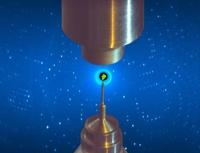Speaker
Description
KWS-2 represents a classical pinhole SANS diffractometer where, combining the conventional mode using different neutron wavelengths and detection distances with the focusing mode using MgF2 lenses, a wide Q-range between 1 x 10-4 and 1 Å-1 can be explored. The high neutron flux, comparable with that of the world leading SANS instruments, which is supplied by the neutron delivery system (cold source, selector, guides) and the multi-MHz detection system enable high intensity measurements and time-resolved studies with ms time resolution. Using choppers and TOF data acquisition the wavelength resolution can be tuned between 1 and 20% and inelastic-free measurements are enabled, thus data with reduced incoherent background from highly protonated samples. A broad range of in-situ complementarities (FT-IR, UV-Vis, DLS) are available or in development for providing additional information at local molecular level or monitoring the sample quality/composition during the SANS investigation.
The instrument is designed for the study of complex morphologies and structural correlations over the mesoscopic length scale in the fields of soft condensed matter, chemistry, and biology. To optimize the use of the beam-time and to expand the instrument performance, robotics for a continuous supply of the instrument with samples and wide-angle scattering capabilities are in development.
The instrument concept and its relevant performance for studies in the life sciences field will be presented.

